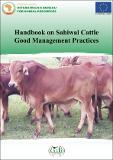| dc.contributor.author | AU-IBAR | |
| dc.contributor.author | KALRO | |
| dc.date.accessioned | 2021-04-21T15:27:38Z | |
| dc.date.available | 2021-04-21T15:27:38Z | |
| dc.date.issued | 2019 | |
| dc.identifier.citation | Samuel M. Mbuku, Thomas Magothe, Mary Mbole-Kariuki, and Erick Mungube, 2019. Handbook on Sahiwal Cattle Good Management Practices. A Technical Handbook - Joint Publication of the Kenya Agricultural and Livestock Research Organization, and African Union Inter-African Bureau for Animal Resources, Nairobi, Kenya, pp 78. | en |
| dc.identifier.uri | http://repository.au-ibar.org/handle/123456789/520 | |
| dc.description.abstract | This handbook on Sahiwal cattle management practices has been designed
keeping the requirements of the farmers and extension agencies in mind. The
handbook attempts to provide basic information on breeding, healthcare, nutrition,
fodder production, routine management, marketing based on existing and new
technologies, along with illustrations. Such information is usually not available from
a single source. We sincerely hope that the handbook would be useful to Sahiwal
farmers and practitioners in Eastern Africa. | en |
| dc.description.sponsorship | European Union | en |
| dc.format.extent | 87 pages | en |
| dc.language.iso | en | en |
| dc.publisher | AU-IBAR | en |
| dc.subject | Live2Africa | en |
| dc.subject | Livestock Development | en |
| dc.subject | Sahiwal Cattle | en |
| dc.title | Handbook on Sahiwal Cattle Good Management Practices | en |
